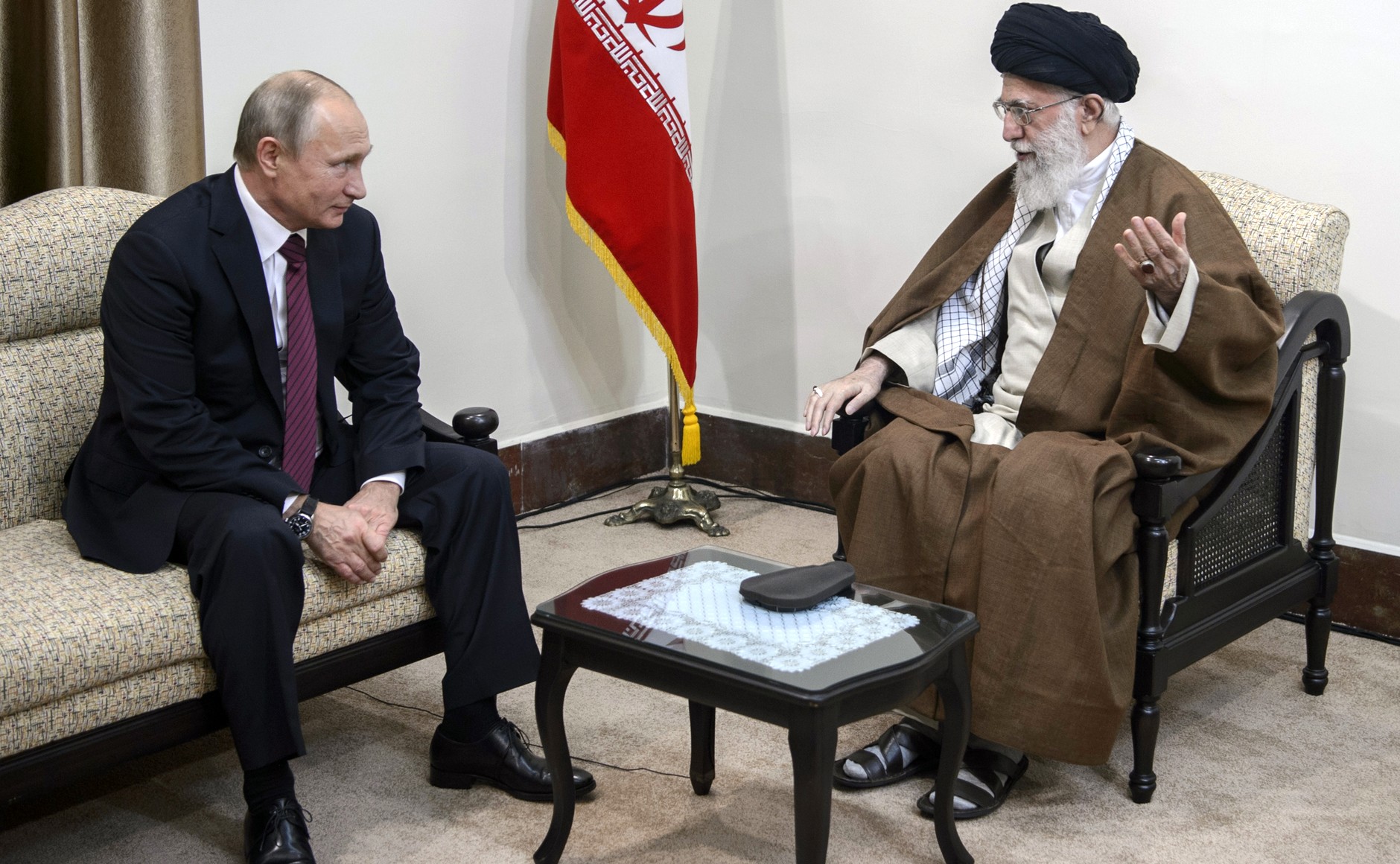Iran's Attitude to Russia's Aggression Against Ukraine
Iran’s cautious approach towards Russia’s war with Ukraine, and its lack of condemnation, are a result of the “strategic partnership” between Russia and Iran, and of hostility to the United States. Iran will not actively support Russia, despite two decades of this partnership and both countries’ claims that the war is the fault of the U.S. and NATO. Regional concerns in the context of an anticipated reduction in Russia’s military presence in Syria and Armenia, and prospects of the removal of U.S. sanctions (with the possible renewal of nuclear deal conditions) are crucial influences on Iran’s attitude.
 Kremlin Pool/ Russian Look/ FORUM
Kremlin Pool/ Russian Look/ FORUM
What is Iran’s stance regarding Russian aggression in Ukraine?
The Iranian government’s reaction to the war is based on the “strategic partnership” with Russia (which has developed since 2001) and its hostility to the United States. During a telephone call to President Vladimir Putin on 24 February, President Ebrahim Raisi recognised Russia’s reasoning for the war, and in a statement after that stated that “expansion of NATO is a serious threat to the stability and security of independent countries in different regions”. A meeting of the government of Iran also claimed NATO was responsible for the war, albeit while declaring its attachment to the rules of sovereignty and territorial integrity. On 1 March, supreme leader Ali Khamenei declared his support for a swift end to the war, while still framing the conflict in terms of a “U.S. conspiracy” of which Ukraine was a victim. On 2 March, Iran abstained from voting on a resolution of the United Nations General Assembly calling for Russia to withdraw its forces from Ukraine immediately. Moreover, on 7 April Iran voted against the exclusion of Russia from the United Nations Human Rights Council. It took until 13 April and a telephone call between the heads of Ukraine’s and Iran’s foreign ministries before the two sides agreed that there had to be a political solution to the war. Iran also agreed to send Iranian medics to Ukraine. According to the Ukrainian side, Iran was supportive of Ukraine, but this aspect was not present in the official communique from the Iranian ministry. At the same time, Iran hopes that the price of oil will rise, and that its raw materials will return to European and Asian markets. However, neither of these things are likely as long as U.S. sanctions remain in place.
What are the reactions of the Iranian elites and society?
Unofficial comments by some of the Iranian elite were much more distanced if not openly critical of Russia. Of special importance were comments in state and social media by politicians ideologically close to Khamenei and Raisi. Ali Mothari, a former conservative parliamentarian, said the government of Iran should condemn Russia for aggression similar to the conquest of the Caucasus and Soviet support for Iraq during the war with Iran. Ultraconservative former president Mahmoud Ahmadinejad praised President Volodymyr Zelensky and Ukrainians for “almost unrivalled resistance [which] uncovered the Satanic plots of enemies of mankind”. Critical reactions to the official policy of Iran were also posted in social media after security forces blocked any protest in front of the Russian embassy in Tehran. However, the government permitted a small demonstration of support of Ukraine in front of that country’s embassy, where protesters chanted slogans against Russia and Putin. It should be noted that, despite the historical enmity of many Iranians to Russia, many citizens of Tehran also have fresh memories of the tragedy (shared with Ukrainians) of the mistakenly shot down PS752 airliner in January 2020.
Will Iran actively support Russia against Ukraine?
Taking into consideration public opinion and the high cost of the COVID-19 pandemic for Iran’s economy, it is unlikely that it will consider anything more than rhetorical support for Russia. The Iranian government may continue propaganda against the U.S. and NATO, but Iranian society has access to independent sources of information so it cannot ignore popular sympathy for Ukraine as a clear victim of aggression. If the war proves to be protracted, Iran may be interested in presenting itself as another mediator in diplomatic talks between Russia and Ukraine, an ambition similar to that of Turkey and Israel. But real support for Russia will be limited by the security situation in the Middle East and southern Caucasus. Iran might be particularly concerned about any limitations on Russia’s air power and material support for the Syrian regime of Bashar Assad, who is a common ally of both states. Iran is not ready to direct any bigger contingent of volunteers from pro-Iranian militias of Lebanon, Iraq and Yemen to fight in Ukraine. For the same reasons, Iran might also be concerned with some declarations of Russia that it will welcome the presence and support of Syrian mercenaries. Other concerns and limitations are tied to the potential for a renewed Karabakh conflict between Azerbaijan and Armenia, the latter being seen both by Iran and Russia as a state limiting Turkey’s influence over the Caucasus region.
Will war have impact on the full renewal of a nuclear deal with Iran?
Russia’s war with Ukraine has a negligible impact on the prospects for the renewal of the German/five great powers’ 2015 nuclear deal with Iran (JCPOA), , from which the U.S. unilaterally withdrew under President Donald Trump in 2018. The Joe Biden Administration seeks to limit the enrichment of uranium by Iran above limits set by the JCPOA, and seems to be ready to recognise some additional demands for Iran to return to the status quo. Even though, on 5 March, Russia demanded from the U.S. guarantees of exemption from sanctions regarding cooperation with Iran, it seems that Russia has limited opportunities to sabotage or to block nuclear negotiations. This is because compromise between the U.S. and Iran (lifting further U.S. sanctions in return for limits on the scale of the Iranian nuclear programme) are crucial for the JCPOA. Nevertheless, even if nuclear negotiations in Vienna are a complete success, it should not be expected that there will be a further re-evaluation of Iran’s policy in the Middle East, or that it will depart from good relations with Russia.


